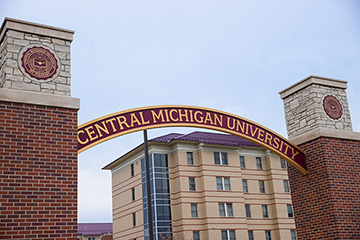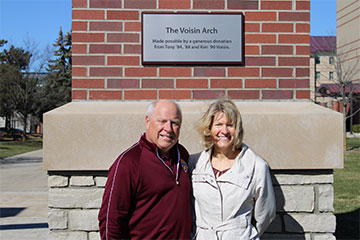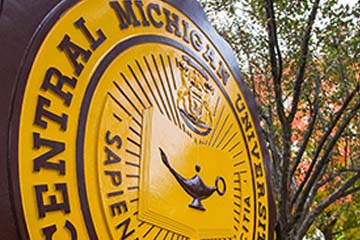A home for everyone
Residence Life inclusion assistants program builds on a legacy of care and support
Students don't arrive at Central Michigan University as a blank slate.
They bring with them life experiences interwoven with personal identities like race, gender identity, socioeconomic status, political persuasion, national origin and faith.
Inclusivity is in the university's values and vision, but creating a safe and supportive space for all students requires more than words. As Alex Martinez puts it, it takes time, emotional energy and heavy lifting.
Martinez, assistant director of Residence Life, supervises the department's inclusion assistants program. This group of student staff in each residential hall supports underrepresented and marginalized groups, provides peer interaction and connects them to the greater CMU community.
The inclusion assistants program celebrates its 30th year at CMU this year. Known formerly as a multicultural advisor, it was recently renamed to emphasize that the program supports all identities — not just those based on race or ethnicity.
"In addition to enhancing the support of students with underrepresented and or marginalized identities, the role of an inclusion assistant is to educate community members on topics of equity and justice and to bridge campus resources and partnerships," Martinez said.
"It feels more authentic and it feels more loving when you are right there in front of the person talking. The way that we get this important information to students is to create relationships." – Callie Hutcheson, sophomore, inclusion assistant for Kesseler Hall
Inclusion assistants engage with residents by talking one on one, sharing insights from their participation in relevant campus events or creating learning opportunities with a full-time residence hall director.
Besides the residence hall directors and other staff, several others in the residential community contribute to the program, including the paraprofessional staff training and inclusion committee.
An inclusive community of scholars
DaeSean Ashby, a graduate student in political science from Detroit, Michigan, has been an inclusion assistant for nearly two and a half years.
"I see my work as a means to complete hard conversations," Ashby said.
Inclusion assistants like Ashby are expected to learn alongside the students they support. Residence Life hosts monthly training sessions for inclusion assistants and asks them to prepare self-guided learning experiences for students. This can take days — sometimes weeks — of preparation.
The learning experiences vary. Some students create displays in their halls; others prepare PowerPoint presentations paired with a lecture. Ashby recently completed a session where he asked students to decorate cupcakes, with each topping representing a layer of personal privilege.
"Activities like these are supposed to instill a sense of empathy, "Ashby said. "You can't control who you are, where you were born, or what level of privilege you have. What you can do is take time to consider how other people's backgrounds shaped their experiences, for better or worse."
Ashby looks to his fellow students and peers to measure success. Over the two years he's worked as an inclusion assistant, he's had his share of "aha!" moments — from cathartic group discussions about on-campus issues to interactions that helped a resident become more thoughtful when speaking about race, gender and identity.
That positive impact can also be seen in students like Callie Hutcheson, a sophomore from Troy, Michigan, majoring in cultural and global studies. After being one of Ashby's residents, she decided that she wanted to become an inclusion assistant herself.
For Hutcheson, honest, person-to-person conversations on inclusion and identity — unlike the kind of one-upmanship often found online — is key for inclusion assistants.
"It feels more authentic and loving when you are right there in front of the person talking," Hutcheson said. "The way that we get this important information to students is to create relationships."
What does it take to be an inclusion assistant?
Inclusion assistants are live-in paraprofessional staff members for the Office of Residence Life. The position generally calls for 20 hours of work per week, but this isn't a role that staff clock in and out of.
"You are an inclusion assistant 24/7," Ashby said. "Some days I might finish classes and bump into a resident who needs to talk. Other days, I might just go to my room and work on my homework or a project for my residents."
The minimum qualifications for the position:
- Be a current student with sophomore status or above.
- Have a cumulative GPA of 2.5 or higher at the time of application and during the period of employment.
- Not be on disciplinary probation at CMU or any other university.
- Limit non-academic involvement to a predetermined number of hours.
Martinez stressed that an open mind and willingness to learn is crucial. Additional qualifications can be found on residence life's website.
The Association of College and University Housing Officers awarded CMU faculty and residence life staff a grant to research how the inclusion assistants' program impacts student success in 2018.
"CMU is on the forefront of these initiatives," Martinez said. "We know that there is a positive impact from what we hear from our residents, assistants and community members — now we are seeking to understand how this program influences our communities through a formal study."
The study results are expected to be released next year, according to Martinez




